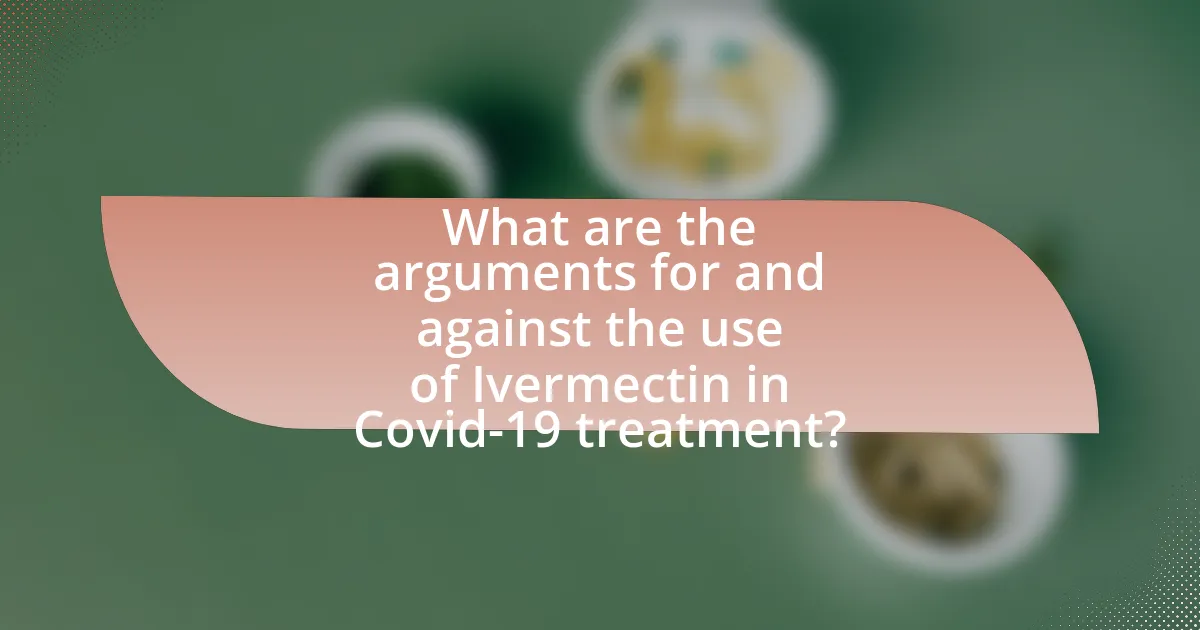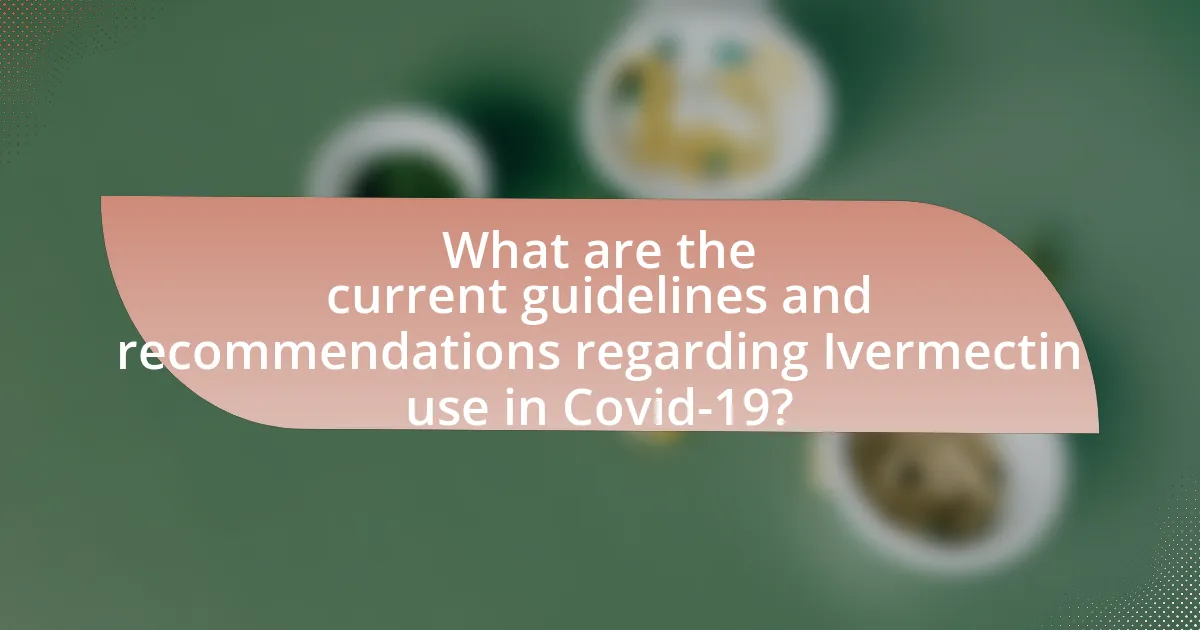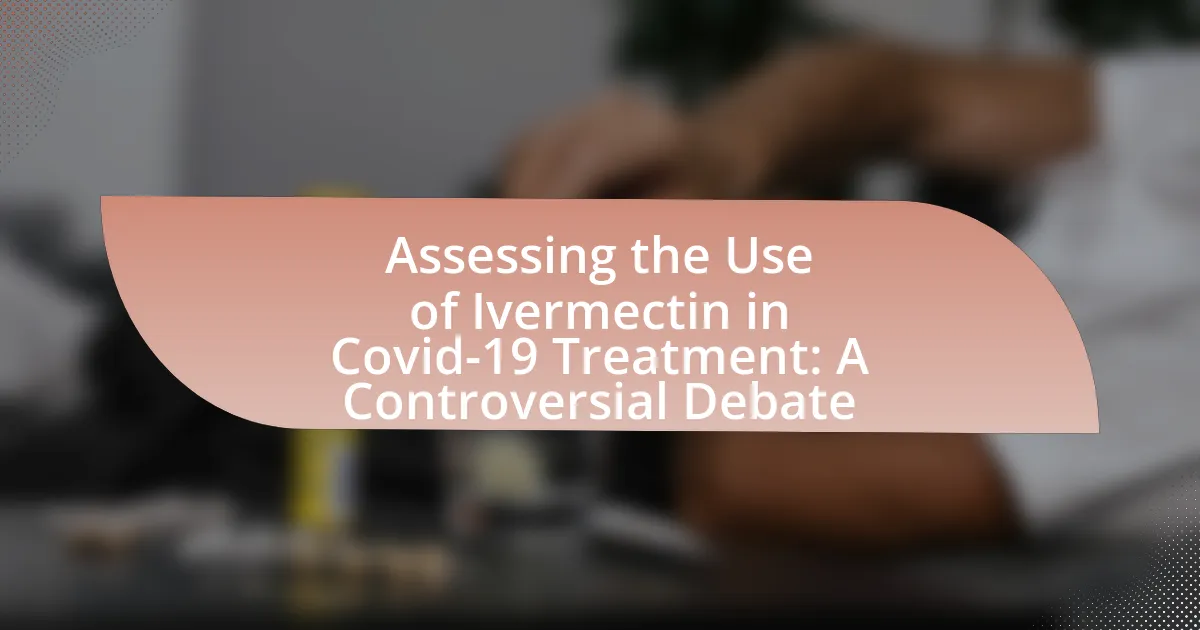Ivermectin, an antiparasitic medication, has been investigated for its potential role in treating Covid-19, despite its primary use for various parasitic infections. While initial studies suggested antiviral properties against SARS-CoV-2, comprehensive clinical trials have shown insufficient evidence to support its efficacy, leading health organizations like the World Health Organization and the U.S. Food and Drug Administration to recommend against its use outside of clinical trials. The article explores the traditional uses of Ivermectin, the controversies surrounding its application in Covid-19 treatment, the mixed results from clinical trials, and the implications of public perception and misinformation on its usage. Additionally, it discusses current guidelines, ongoing research, and the potential risks associated with Ivermectin in the context of Covid-19.

What is Ivermectin and its Role in Covid-19 Treatment?
Ivermectin is an antiparasitic medication that has been investigated for its potential role in the treatment of Covid-19. Initially developed to treat various parasitic infections, studies have explored Ivermectin’s antiviral properties against SARS-CoV-2, the virus responsible for Covid-19. However, clinical trials and reviews, including a comprehensive analysis published in the Journal of the American Medical Association, have shown insufficient evidence to support its efficacy in treating Covid-19, leading health organizations like the World Health Organization and the U.S. Food and Drug Administration to recommend against its use for this purpose outside of clinical trials.
How is Ivermectin traditionally used in medicine?
Ivermectin is traditionally used in medicine as an antiparasitic agent. It is primarily prescribed for the treatment of various parasitic infections, including onchocerciasis (river blindness), lymphatic filariasis, and strongyloidiasis. The World Health Organization recognizes Ivermectin as an essential medicine, highlighting its effectiveness in treating these conditions, which affect millions globally. Its mechanism of action involves binding to specific chloride channels in parasites, leading to paralysis and death of the parasites.
What are the primary indications for Ivermectin use?
Ivermectin is primarily indicated for the treatment of parasitic infections, including onchocerciasis (river blindness), lymphatic filariasis, strongyloidiasis, and scabies. These indications are supported by its mechanism of action, which involves binding to specific chloride channels in parasites, leading to paralysis and death of the organisms. The World Health Organization recognizes Ivermectin as an essential medicine for its effectiveness against these conditions, highlighting its role in public health initiatives aimed at controlling parasitic diseases.
How does Ivermectin function at a biochemical level?
Ivermectin functions at a biochemical level by binding to specific ion channels in the membranes of cells, particularly glutamate-gated chloride channels, which are crucial for the nervous system of parasites and certain viruses. This binding leads to an increase in the permeability of the cell membrane to chloride ions, resulting in paralysis and death of the target organism. Additionally, Ivermectin has been shown to inhibit the replication of some viruses by interfering with their ability to enter host cells, as evidenced by studies demonstrating its antiviral properties against various pathogens.
What led to the consideration of Ivermectin for Covid-19?
The consideration of Ivermectin for Covid-19 arose from its antiviral properties observed in vitro against various viruses, including SARS-CoV-2. Initial studies suggested that Ivermectin could inhibit the replication of the virus, prompting researchers to explore its potential as a treatment option. Furthermore, anecdotal reports and early observational studies indicated possible benefits in Covid-19 patients, which fueled interest and led to clinical trials assessing its efficacy and safety in this context.
What evidence initially suggested Ivermectin might be effective against Covid-19?
Initial evidence suggesting Ivermectin might be effective against Covid-19 came from in vitro studies that demonstrated its ability to inhibit the replication of SARS-CoV-2, the virus responsible for Covid-19. Specifically, a study published in the American Journal of Antiviral Research in 2020 indicated that Ivermectin could reduce viral RNA by up to 99.8% within 48 hours in cell cultures. This prompted further investigation into its potential therapeutic effects in humans, despite the need for more rigorous clinical trials to validate these findings.
How did the global health crisis influence the exploration of Ivermectin?
The global health crisis significantly accelerated the exploration of Ivermectin as a potential treatment for COVID-19. Researchers and healthcare professionals sought existing medications that could be repurposed quickly to address the urgent need for effective therapies against the virus. Ivermectin, previously used for parasitic infections, gained attention due to its antiviral properties observed in laboratory settings. Studies, such as those published in the Journal of Antibiotics, indicated that Ivermectin could inhibit SARS-CoV-2 replication in vitro, prompting further clinical trials to evaluate its efficacy in treating COVID-19 patients. This urgency led to a surge in research and debate regarding Ivermectin’s role, highlighting both its potential benefits and the controversies surrounding its use in the pandemic context.
What are the main controversies surrounding Ivermectin’s use in Covid-19 treatment?
The main controversies surrounding Ivermectin’s use in Covid-19 treatment include its efficacy, safety, and the influence of misinformation. Studies have produced mixed results regarding Ivermectin’s effectiveness against Covid-19, with some trials suggesting minimal benefits while others indicate potential positive outcomes. The World Health Organization and the U.S. Food and Drug Administration have both advised against its use for Covid-19 outside of clinical trials, citing insufficient evidence. Additionally, the promotion of Ivermectin by some public figures and groups has led to widespread misinformation, complicating public perception and leading to increased self-medication, which raises safety concerns. These factors contribute to the ongoing debate and controversy surrounding Ivermectin’s role in treating Covid-19.
What do clinical trials say about Ivermectin’s efficacy for Covid-19?
Clinical trials indicate that Ivermectin is not effective for treating Covid-19. A systematic review and meta-analysis published in the Journal of the American Medical Association (JAMA) in 2021 analyzed multiple studies and concluded that Ivermectin did not significantly reduce mortality or improve clinical outcomes in Covid-19 patients. Additionally, the World Health Organization (WHO) and the U.S. Food and Drug Administration (FDA) have both recommended against the use of Ivermectin for Covid-19 outside of clinical trials, citing insufficient evidence of its efficacy.
How have health organizations responded to the use of Ivermectin for Covid-19?
Health organizations have largely advised against the use of Ivermectin for the treatment of Covid-19. The World Health Organization (WHO) and the U.S. Food and Drug Administration (FDA) have both stated that there is insufficient evidence to support its efficacy in treating Covid-19, emphasizing that Ivermectin is not approved for this purpose. The WHO’s guidelines, updated in March 2021, recommend that Ivermectin should only be used within clinical trials. Similarly, the FDA has issued warnings against its use outside of approved indications, citing potential risks and lack of proven benefit. These positions are based on reviews of available clinical data, which have not demonstrated significant positive outcomes for Covid-19 patients treated with Ivermectin.

What are the arguments for and against the use of Ivermectin in Covid-19 treatment?
The arguments for the use of Ivermectin in Covid-19 treatment include its antiviral properties, which some studies suggest may inhibit the replication of the virus. Proponents cite research, such as a study published in the American Journal of Therapeutics, which indicated potential benefits in reducing the severity of Covid-19 symptoms. Conversely, arguments against its use highlight a lack of robust clinical evidence supporting its efficacy for Covid-19, with organizations like the World Health Organization and the U.S. Food and Drug Administration advising against its use outside of clinical trials due to insufficient data. Critics point to systematic reviews, such as one published in the Cochrane Database, which concluded that Ivermectin does not significantly reduce mortality or the need for mechanical ventilation in Covid-19 patients.
What are the potential benefits of using Ivermectin for Covid-19 patients?
Ivermectin may offer potential benefits for Covid-19 patients by exhibiting antiviral properties and reducing inflammation. Some studies suggest that Ivermectin can inhibit the replication of SARS-CoV-2, the virus responsible for Covid-19, thereby potentially decreasing viral load. For instance, a study published in the American Journal of Therapeutics indicated that Ivermectin could lead to improved clinical outcomes in patients with mild to moderate Covid-19. However, the overall efficacy and safety of Ivermectin for Covid-19 treatment remain subjects of ongoing research and debate within the medical community.
How might Ivermectin reduce the severity of Covid-19 symptoms?
Ivermectin may reduce the severity of Covid-19 symptoms by inhibiting viral replication and modulating the immune response. Studies suggest that Ivermectin can interfere with the SARS-CoV-2 virus’s ability to enter human cells, thereby limiting its replication. For instance, a study published in the Journal of Antimicrobial Chemotherapy demonstrated that Ivermectin reduced viral load in vitro, indicating its potential to diminish the severity of infection. Additionally, Ivermectin has anti-inflammatory properties that could help mitigate the hyper-inflammatory response associated with severe Covid-19 cases.
What are the economic implications of using Ivermectin in treatment protocols?
The economic implications of using Ivermectin in treatment protocols include potential cost savings in healthcare expenditures and impacts on pharmaceutical markets. Ivermectin is a low-cost generic medication, which could reduce treatment costs compared to more expensive alternatives, potentially leading to lower overall healthcare spending during pandemics. For instance, a study published in the Journal of Global Health indicated that widespread use of low-cost treatments could alleviate financial burdens on healthcare systems, especially in low- and middle-income countries. Additionally, if Ivermectin were to be widely adopted, it could disrupt the market for more expensive COVID-19 treatments, influencing pricing strategies and investment in pharmaceutical research and development.
What are the risks and side effects associated with Ivermectin use in Covid-19?
Ivermectin use in Covid-19 is associated with several risks and side effects, including gastrointestinal issues, skin rashes, and neurological effects such as dizziness and seizures. Clinical studies have reported that adverse reactions can occur, with some patients experiencing severe allergic reactions. The World Health Organization and the U.S. Food and Drug Administration have cautioned against the use of Ivermectin for Covid-19 outside of clinical trials due to insufficient evidence of its efficacy and potential for harm.
What adverse effects have been reported in patients taking Ivermectin for Covid-19?
Adverse effects reported in patients taking Ivermectin for Covid-19 include gastrointestinal symptoms such as nausea, diarrhea, and abdominal pain, as well as neurological effects like dizziness and headaches. Clinical studies and case reports have documented these side effects, indicating that while Ivermectin is generally well-tolerated, some patients experience these adverse reactions. For instance, a systematic review published in the American Journal of Therapeutics noted that the most common side effects were mild and transient, but emphasized the need for caution in its use for Covid-19 treatment.
How do the risks of Ivermectin compare to other Covid-19 treatments?
The risks of Ivermectin are generally considered to be lower than those associated with some other Covid-19 treatments, particularly when comparing it to antiviral medications like Remdesivir or monoclonal antibodies, which can have significant side effects. Ivermectin has a well-established safety profile in its approved uses, with common side effects being mild and transient, such as gastrointestinal discomfort. In contrast, treatments like Remdesivir can lead to more severe adverse reactions, including liver toxicity and renal impairment. Clinical studies have indicated that while Ivermectin’s efficacy against Covid-19 remains debated, its risk profile is less concerning compared to these other treatments, which have documented serious side effects in various patient populations.
How has public perception influenced the debate on Ivermectin?
Public perception has significantly influenced the debate on Ivermectin by shaping opinions on its efficacy and safety as a treatment for COVID-19. The widespread dissemination of information through social media and news outlets has led to polarized views, with some advocating for its use based on anecdotal evidence and others opposing it due to a lack of robust clinical trial data. For instance, a survey conducted by the Pew Research Center in early 2021 indicated that a substantial portion of the public believed Ivermectin was effective, despite the World Health Organization and the U.S. Food and Drug Administration advising against its use for COVID-19 due to insufficient evidence. This divergence in public belief has fueled ongoing discussions and controversies within the medical community and among policymakers, complicating the consensus on treatment protocols.
What role does misinformation play in the public’s understanding of Ivermectin?
Misinformation significantly distorts the public’s understanding of Ivermectin, leading to confusion about its efficacy and safety as a treatment for COVID-19. Numerous studies, including a systematic review published in the American Journal of Therapeutics, have shown that Ivermectin is not effective against COVID-19, yet misleading claims circulated on social media and other platforms have perpetuated the belief that it is a viable treatment option. This misinformation has resulted in increased demand for the drug, despite health authorities like the FDA and WHO advising against its use for COVID-19, thereby complicating public health messaging and potentially endangering lives.
How have social media and public figures impacted the discourse on Ivermectin?
Social media and public figures have significantly influenced the discourse on Ivermectin by amplifying both support and skepticism regarding its use for COVID-19 treatment. Prominent figures, including politicians and celebrities, have publicly endorsed Ivermectin, leading to increased interest and demand among the public. For instance, in 2021, high-profile endorsements on platforms like Twitter and Facebook contributed to a surge in prescriptions and discussions about the drug, despite the lack of robust clinical evidence supporting its efficacy against COVID-19. Conversely, health organizations and experts have utilized social media to counter misinformation, emphasizing that regulatory bodies like the FDA and WHO have not approved Ivermectin for COVID-19 treatment due to insufficient evidence. This dual impact has created a polarized environment where misinformation and validated scientific discourse coexist, complicating public understanding and decision-making regarding Ivermectin’s use.

What are the current guidelines and recommendations regarding Ivermectin use in Covid-19?
Current guidelines and recommendations state that Ivermectin is not authorized or approved for the treatment of COVID-19. The World Health Organization (WHO) advises against its use outside of clinical trials, citing insufficient evidence of its efficacy. The U.S. Food and Drug Administration (FDA) has also issued warnings against using Ivermectin for COVID-19, emphasizing that it has not been proven safe or effective for this purpose. These positions are supported by multiple studies, including a systematic review published in the Journal of the American Medical Association, which concluded that Ivermectin does not significantly reduce mortality or the need for mechanical ventilation in COVID-19 patients.
What do leading health organizations recommend about Ivermectin for Covid-19 treatment?
Leading health organizations, including the World Health Organization (WHO) and the U.S. Food and Drug Administration (FDA), do not recommend Ivermectin for the treatment of Covid-19. The WHO states that there is insufficient evidence to support its use for Covid-19, and the FDA has issued warnings against using Ivermectin intended for animals in humans. These organizations emphasize that clinical trials have not demonstrated Ivermectin’s efficacy in treating Covid-19, and they advise relying on authorized vaccines and treatments that have been proven effective.
How do these recommendations vary by region or country?
Recommendations for the use of Ivermectin in COVID-19 treatment vary significantly by region and country due to differing regulatory stances and clinical guidelines. For instance, the World Health Organization (WHO) has advised against the use of Ivermectin for COVID-19 outside of clinical trials, while countries like India have included it in their treatment protocols for mild cases. In contrast, the U.S. Food and Drug Administration (FDA) has issued warnings against its use for COVID-19, emphasizing that it is not approved for this purpose. These variations reflect local health policies, the availability of alternative treatments, and the influence of public health messaging, which can lead to differing levels of acceptance and usage among healthcare providers and the public.
What are the implications of these guidelines for healthcare providers?
The implications of these guidelines for healthcare providers include the necessity to critically evaluate the use of ivermectin in COVID-19 treatment based on emerging evidence and recommendations. Healthcare providers must adhere to updated clinical guidelines that may restrict or endorse the use of ivermectin, influencing treatment protocols and patient management strategies. For instance, the World Health Organization and the U.S. Food and Drug Administration have issued statements advising against the use of ivermectin for COVID-19 outside of clinical trials, which directly impacts prescribing practices and patient counseling. This adherence to guidelines ensures that healthcare providers deliver evidence-based care, minimizing potential harm and optimizing patient outcomes.
What future research is needed to clarify Ivermectin’s role in Covid-19 treatment?
Future research needed to clarify Ivermectin’s role in Covid-19 treatment includes large-scale randomized controlled trials to assess its efficacy and safety in diverse populations. Current studies, such as the one published in the American Journal of Therapeutics, indicate mixed results, highlighting the necessity for comprehensive investigations that control for variables like dosage, timing of administration, and patient demographics. Additionally, research should focus on the mechanisms of action of Ivermectin against SARS-CoV-2, as understanding its pharmacodynamics could provide insights into its potential therapeutic benefits or limitations.
What specific studies are currently underway regarding Ivermectin and Covid-19?
Currently, several studies are underway to assess the efficacy of Ivermectin in treating Covid-19. One notable study is the “Ivermectin for Prevention and Treatment of Covid-19 Infection” trial, which is being conducted by the University of California, San Francisco. This randomized controlled trial aims to evaluate the safety and effectiveness of Ivermectin in patients diagnosed with Covid-19. Additionally, the “Ivermectin in Covid-19 Patients” study, led by researchers at the University of São Paulo, is investigating the drug’s impact on viral load and clinical outcomes in hospitalized patients. These studies are part of a broader effort to clarify the role of Ivermectin in Covid-19 treatment amidst ongoing debates regarding its use.
How might future findings impact the ongoing debate about Ivermectin?
Future findings could significantly influence the ongoing debate about Ivermectin by providing clearer evidence regarding its efficacy and safety in treating COVID-19. For instance, if upcoming clinical trials demonstrate a substantial benefit of Ivermectin in reducing COVID-19 severity or mortality, it may lead to broader acceptance and recommendations for its use. Conversely, if future studies confirm previous findings that show no significant effect, it could reinforce skepticism and discourage its use in treatment protocols. The World Health Organization and other health authorities have based their guidelines on existing evidence, and new data could prompt a reevaluation of these recommendations, impacting public health policies and clinical practices.
What practical considerations should patients and healthcare providers keep in mind regarding Ivermectin?
Patients and healthcare providers should consider the evidence supporting Ivermectin’s efficacy and safety in treating COVID-19, as current research indicates mixed results. The World Health Organization (WHO) and the U.S. Food and Drug Administration (FDA) have advised against using Ivermectin for COVID-19 outside of clinical trials due to insufficient evidence of benefit and potential risks. Additionally, patients should be aware of the correct dosage and potential drug interactions, as improper use can lead to adverse effects. Healthcare providers must stay updated on guidelines and emerging research to make informed decisions regarding treatment options.
What should patients know before considering Ivermectin for Covid-19?
Patients should know that Ivermectin is not approved by health authorities for the treatment of Covid-19. The U.S. Food and Drug Administration (FDA) has stated that Ivermectin is intended for use in specific parasitic infections and has not been shown to be safe or effective for Covid-19 treatment. Clinical studies have produced mixed results, and the World Health Organization (WHO) recommends against its use outside of clinical trials. Therefore, patients should consult healthcare professionals for evidence-based treatments and avoid self-medicating with Ivermectin for Covid-19.
How can healthcare providers navigate the complexities of prescribing Ivermectin?
Healthcare providers can navigate the complexities of prescribing Ivermectin by adhering to established clinical guidelines and evaluating the current evidence regarding its efficacy and safety for COVID-19 treatment. The World Health Organization (WHO) and the U.S. Food and Drug Administration (FDA) have issued recommendations against the use of Ivermectin for COVID-19 outside of clinical trials, citing insufficient evidence to support its effectiveness. Providers should also consider patient-specific factors, such as underlying health conditions and potential drug interactions, while staying informed about ongoing research and emerging data. This approach ensures that prescribing practices align with the latest scientific consensus and regulatory guidance, ultimately prioritizing patient safety and treatment efficacy.


